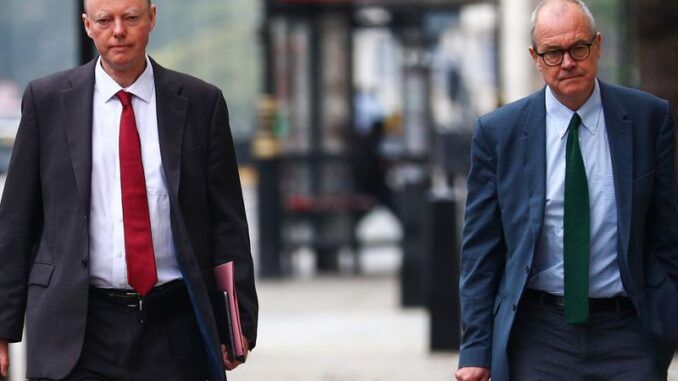
The UK faces a “prolonged period” of excess deaths due to the collateral effects of the lockdown, according to Sir Chris Whitty and Sir Patrick Vallance.
They claim that the nation is facing a rising death toll from heart disease and cancer after operations were cancelled and people avoided the NHS during the pandemic
It was these characters who told people to stay home to avoid spreading the virus.

BYPASS THE CENSORS
Sign up to get unfiltered news delivered straight to your inbox.
You can unsubscribe any time. By subscribing you agree to our Terms of Use
The Chief Medical Officer (CMO) for England and Chief Scientific Adviser made their comments in a technical report on the pandemic, published Thursday, advising future health chiefs how to deal with similar threats.
MSN reports: Across eleven chapters the authors cover topics such as care homes, contract tracing, testing and lockdowns.
An introduction to the report stresses it is not a “definitive narrative” of the pandemic to date, or policy decisions taken. However, it’s the first comprehensive run-through of events and implications, which occured over the last two-and-a-half years, published by officials.
It comes after the start of the UK Covid-19 inquiry, chaired by Baroness Heather Hallett, which will begin public hearings next year examining the Government response to the pandemic.
Report suggests GPs moving to remote appointments
In chapter 10, “improvements in care of COVID-19”, the authors set out changes to healthcare, such as GPs moving to remote appointments and the postponement of elective surgeries.
There were “limits” to how far telephone and video GP appointments could replace face-to-face appointments, the report said, but added “in many cases the balance of risks and benefits still favoured remote support”.
Discussing measures put in place to respond to the surge in Covid patients it said: “Shifting to remote consultations, discouraging unnecessary health setting presentations and asking that those with specific symptoms avoid healthcare settings unless necessary has been an effective way to reduce potential transmission risks and additional burden during a time of significant pressure.
“However, this must be balanced with a risk that health-seeking behaviours were adjusted to such a degree that there was significant unmet need, with resulting impacts on mortality and morbidity.”
Despite Sir Chris stressing public “emergency care was always open for business” , far fewer people presented at A&E during the first wave, the report said.
“Undoubtedly some people who would (and could) have come forward did not because of a sense of altruism or perceived risk of being in hospital,” it added.
Delays in patients coming forward for help, a reduction in preventative medication – such as statins – and the cancellation of surgeries and screenings “will have led to later and more severe” non-Covid illness, the authors conclude.
“The combined effect of this will likely lead to a prolonged period of non-COVID excess mortality and morbidity after the worst period of the pandemic is over,” it said.


